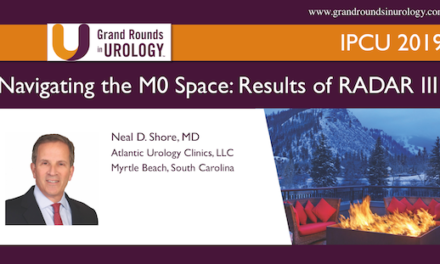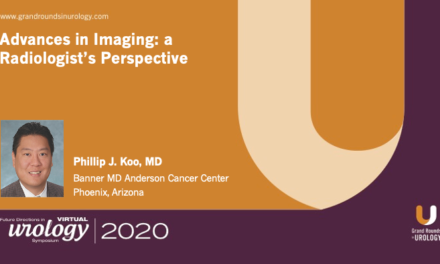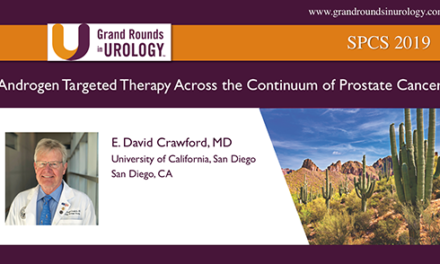Neal D. Shore, MD, presented “PSMA PET-CT: Clinical Applications” during the virtual 5th Global Summit on Precision Diagnosis and Treatment of Prostate Cancer in September 2021.
How to cite: Shore, Neal D. “PSMA PET-CT: Clinical Applications.” September 2021. Accessed Jun 2025. https://grandroundsinurology.com/psma-pet-ct-clinical-applications/
Summary:
In this presentation, supported by Telix Pharmaceuticals, Neal D. Shore, MD, FACS, Medical Director for the Carolina Urologic Research Center in Myrtle Beach, South Carolina, and U.S. CMO of Surgery and Oncology for GenesisCare US, presents advances in PSMA PET-CT imaging for staging, prognosis, and clinical management of prostate cancer. He first describes prostate cancer metastases before explaining prostate-specific membrane antigen (PMSA) and how it serves as an effective molecular target for metastatic prostate cancer. Dr. Shore reviews the pros and cons of conventional imaging techniques such as bone scintigraphy, computed tomography (CT), and multiparametric MRI (mpMRI). While treatment guidelines recommend conventional imaging, he notes that bone scans and CT positively identify less than 10% of men with biochemical recurrence and in particular lesions that are <1 cm with a PSA <20 ng/mL. He then compares the benefits of PSMA as an imaging target: it is upregulated in prostate cancer, the degree of expression is positively correlated with tumor state and higher risk of recurrence, there is a positive correlation between PSMA expression and Gleason score/grade, and it may be targeted with either a small molecule or antibody. Dr. Shore reviews numerous studies demonstrating the effectiveness of PSMA PET-CT in metastatic prostate cancer but indicates there is insufficient data on the use of PSMA PET-CT in patients with hormone-naïve disease. He then considers patient selection and points out several downsides including increased cost of care and the potential impact of health disparities. He concludes that PSMA PET-CT is particularly useful in detecting prostate cancer that is otherwise not identified by conventional imaging and in cases with low serum PSA.
The Virtual Global Summit on Precision Diagnosis and Treatment of Prostate Cancer brings together key international opinion leaders of every clinical subspecialty involved in patient care. This event is an integral part of the AdMeTech Foundation’s Annual Summit, which was established in 2016 and became seminal in shaping the state of the art and future vision for precision care. The goal of this event is three-fold: 1) Educating the key stakeholders; 2) Supporting a sustained cross-disciplinary dialogue and consensus on the best emerging clinical practices and research priorities; and 3) Expediting clinical adoption of promising novel diagnostics and therapeutics. For more educational activities from this virtual event, visit our collection page.
ABOUT THE AUTHOR
Neal D. Shore, MD, FACS, graduated from Duke University and Duke University Medical School. He completed his general surgery/urology residency at New York Hospital-Cornell Medical Center/Memorial Sloan Kettering Cancer Center. He serves as the Medical Director for the Carolina Urologic Research Center and is the Chief Medical Officer, Strategic Growth and Pharmacy, GenesisCare, US.
Dr. Shore has conducted more than 400 clinical trials, focusing mainly on genitourinary oncology, and has authored or coauthored more than 350 peer-reviewed publications and numerous book chapters. He serves on the Society for Immunotherapy of Cancer (SITC) Guidelines Committee for Bladder Cancer, as well as the boards of the Bladder Cancer Advocacy Network, Maple Tree Alliance, and the Duke Global Health Institute. He is the Chair of both the Prostate Cancer Academy and the Bladder/Kidney Cancer Academy for the Large Urology Group Practice Association (LUGPA) Specialty Network. He also co-chairs the annual AUA International Prostate Forum. He has served/serves on the editorial boards of Reviews in Urology, Urology Times, Chemotherapy Advisor, OncLive, PLOS ONE, Urology Practice, JUOP and World Journal of Urology, and he also serves as an editor of Everyday Urology-Oncology. He is a Fellow of the American College of Surgeons.




